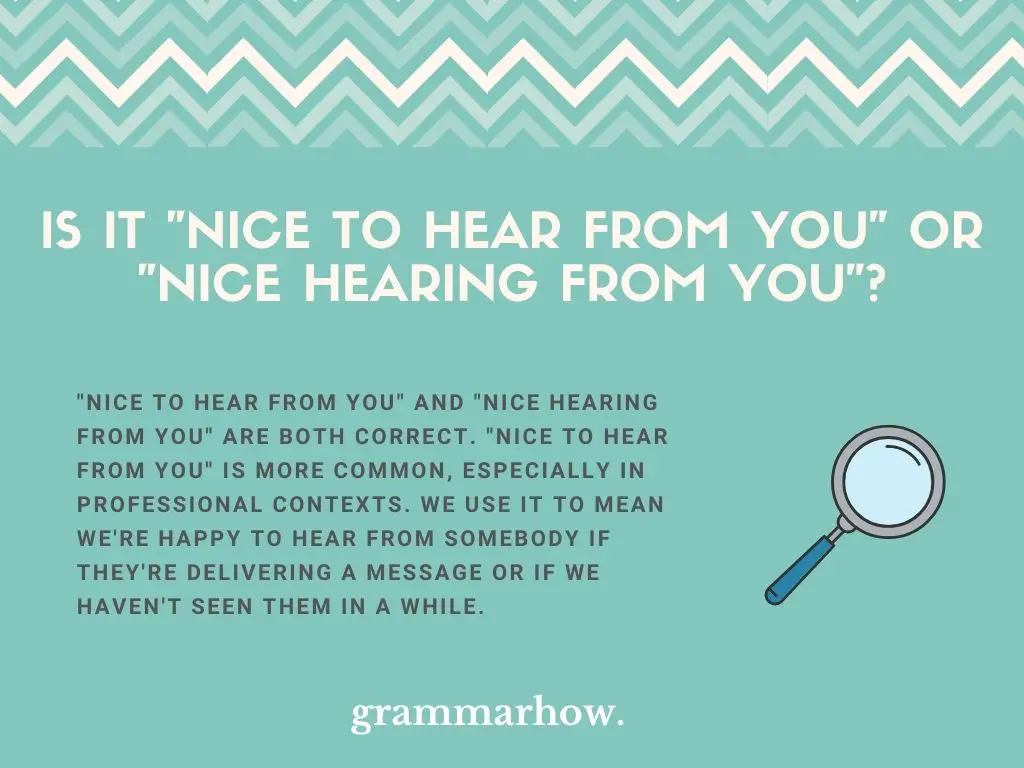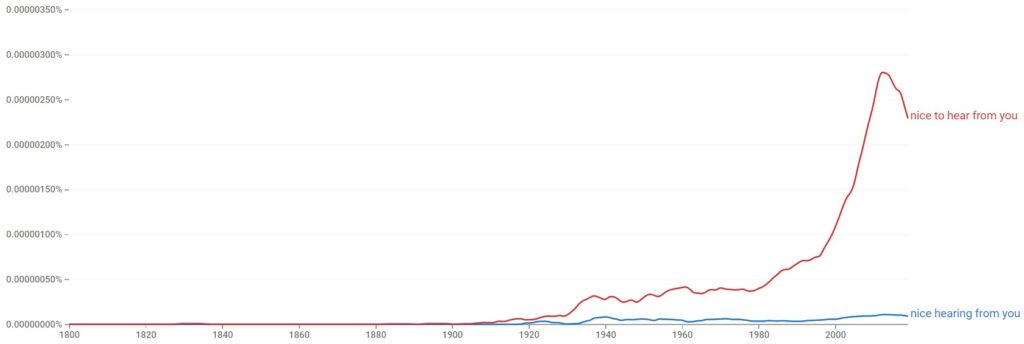The phrases “nice to hear from you” and “nice hearing from you” are ways you can say that you’re happy to receive somebody’s message. It would help you to understand whether they’re both correct and how to use them, which is what this article will aim to do.
Is It “Nice To Hear From You” Or “Nice Hearing From You”?
“Nice to hear from you” and “nice hearing from you” are both correct. “Nice to hear from you” is more common, especially in professional contexts. We use it to mean we’re happy to hear from somebody if they’re delivering a message or if we haven’t seen them in a while.

Sometimes, “nice hearing from you” works best when we’re ending a conversation, while “nice to hear from you” works to start or end one, depending on the context.
However, the phrases both work interchangeably as well. “To hear” and “hearing” are just different verb forms of “hear” with the same meaning. Native speakers will use both, though it’s much less likely that “nice hearing from you” will be used.
If you’re struggling with the differences between the two phrases, you’ll be happy to know that native speakers often won’t mind whichever one you use. They frequently use “nice to hear from you” formally and “nice hearing from you” informally, so you can use them in the same way.
Is It Ever Correct To Use “Nice Hearing From You”?
We’ve already mentioned that “nice hearing from you” is synonymous with “nice to hear from you.” We can use it in much the same way when w want to show that we’re happy to receive information from somebody or see them again.
It is correct to use “nice hearing from you” in the same way as “nice to hear from you.” The main difference is that you’ll often end a conversation with “nice hearing from you,” while you might start or end one with “nice to hear from you.”
Using the verb “hearing” often means that the task of “hearing” has been completed. Therefore, we’re talking about something that happened in the past, and we are no longer “hearing” anything from the person we’re speaking to.
How Prevalent Is The Use Of “Nice To Hear From You” And “Nice Hearing From You”?
Now that we’ve covered the main differences between the phrases, it might help to see which is more common. It’s something that you’ll usually use in professional situations, so we’ll focus on that.
According to Google Ngram Viewer, “nice to hear from you” is vastly more popular than “nice hearing from you.” That’s because it can both start and end a conversation according to the context that you’re using.

“Nice hearing from you” still sees usage, and it’s definitely still a correct variation. However, it’s much more common that you’ll use this when you want to show that you’re ending a more informal conversation.
It’s rare for native speakers to use “nice hearing from you” over “nice to hear from you,” but you can use both interchangeably.
What Does “Nice To Hear From You” Mean?
“Nice to hear from you” means that you’re pleased that someone has come to speak to you or deliver a message. It might also mean that you haven’t seen someone for a while and that you’re happy to hear from them again after such a long time.
We generally say it at the start of a conversation when we’re pleased to hear from somebody we already know. It’s common to say it when we’ve missed that person or when it’s been a particularly long time since we last spoke.
You may want to end a conversation with the phrase when you were pleased with the message they delivered. If it was useful to you in some way, then you might say “nice to hear from you” to indicate that you’re happy that they said something about whatever the situation was.
Examples Of How To Use “Nice To Hear From You” In A Sentence
Now that we’ve studied the meaning and differences, it’s time to go over some examples. We’ll include both variations here, but we’ll mostly focus on the more common “nice to hear from you” so as not to confuse you between them too much.
- It’s nice to hear from you again! Tell me everything that you got up to while you were away.
- It’s truly nice to hear from you, and let me know if there’s anything I can help you with.
- Thank you for getting in touch today; it was nice to hear from you.
- It’s nice to hear from you, and we can’t wait to have another discussion again about this in the future.
- As always, it’s nice hearing from you. You must stay in contact more often because we really miss you!
- Nice hearing from you again! Don’t be a stranger, and make sure you come back as soon as you can!
- It was nice to hear from you. I thought you’d forgotten all about us over here.
- It was nice to hear from you again, and I’ll take what you said into consideration before making any final decisions.
- It’s been nice to hear from you, and I’m sure we can come to some kind of arrangement on these matters.
- As always, it’s been nice to hear from you. Make sure you take some candy before you leave!
We use “nice to hear from you” when we want to greet somebody or say goodbye and show them that we appreciate their presence or the information they provided us.
While it’s common to use this phrase in more formal situations, we can also use it informally. It works especially well when we want to show our friends that we’ve missed their company and want them to visit us again before too long.
How Do You Respond to “Nice To Hear From You”?
Now that we’ve shown you how to say it, we have to show you how to respond to it. Since there are two ways to use it (beginning or ending a conversation), we’ll cover both responses.
At the beginning of a conversation, you should respond by stating that you missed the person too (if you’re casually talking to them and know them) or respond with the information that you have to provide.
It’s less common to need to respond at the end of a conversation. Generally, if someone ends a conversation with “nice to hear from you,” a simple “goodbye” or “nice talking to you” would suffice before you end the conversation.
4 Better Alternatives To Use In Professional Situations
While “nice to hear from you” and “nice hearing from you” are fairly professional phrases, they don’t work very well in most formal contexts. Instead, you might benefit from one of the following alternatives:
- Pleased to hear from you
- Happy to hear from you
- Good to hear from you
- Thank you for calling
The preferred version is “pleased to hear from you” because it works well to show that you’re polite in most professional situations. “Pleased” is a great word that shows you’re genuinely appreciative of receiving a message or correspondence from somebody.
Pleased To Hear From You
“Pleased to hear from you” works well when we want to show that we’re happy to receive someone’s message. We mostly say it in professional situations when we’re pleased that somebody has spoken to us about something, especially if we were expecting them to.
- I’m so pleased to hear from you and hope that you’ll be able to meet me later to talk business.
- We’re pleased to hear from you again. Let us know if you need anything before you’re settled in.
Happy To Hear From You
“Happy to hear from you” is another way to show your happiness that someone has messaged or spoken to you. We use “happy” synonymously with “pleased” to show that we are thrilled or excited about whatever message they have to give us.
- I’m happy to hear from you again, and I look forward to hearing what you might have to say.
- You know that I’m more than happy to hear from you, so let me know what you think.
Good To Hear From You
“Good to hear from you” isn’t quite as potent as the other two above this, but it still works well in professional settings to show that you’re happy that someone has arrived or spoken to you about a matter.
- It’s good to hear from you. If there’s anything you need from me, please let me know.
- It’s so good to hear from you, old friend.
You might also like: Good To Hear vs. Glad To Hear – Difference Explained For Beginners
Thank You For Calling
“Thank you for calling” only works when you’re on a professional phone call, but we thought it’s still a great one to include on the list. It means that you’re pleased that somebody has called you about a problem that they’re having.
- Thank you for calling the helpline. What can we do for you today?
- Thank you for calling. If there’s anything else that we can do, don’t hesitate to let us know.

Martin holds a Master’s degree in Finance and International Business. He has six years of experience in professional communication with clients, executives, and colleagues. Furthermore, he has teaching experience from Aarhus University. Martin has been featured as an expert in communication and teaching on Forbes and Shopify. Read more about Martin here.
